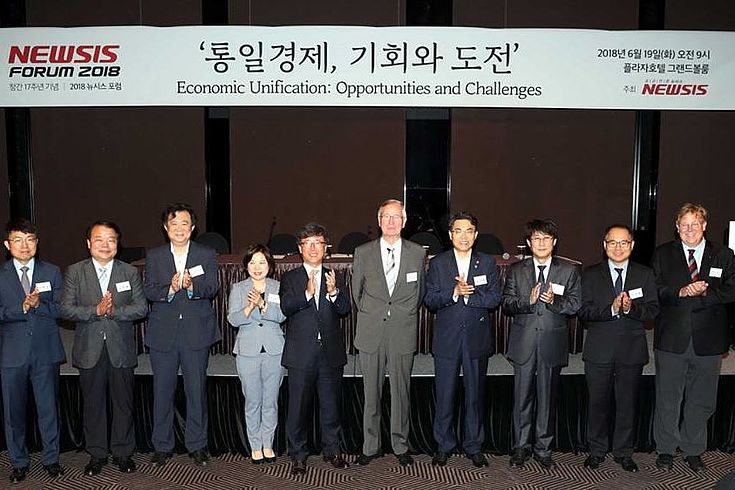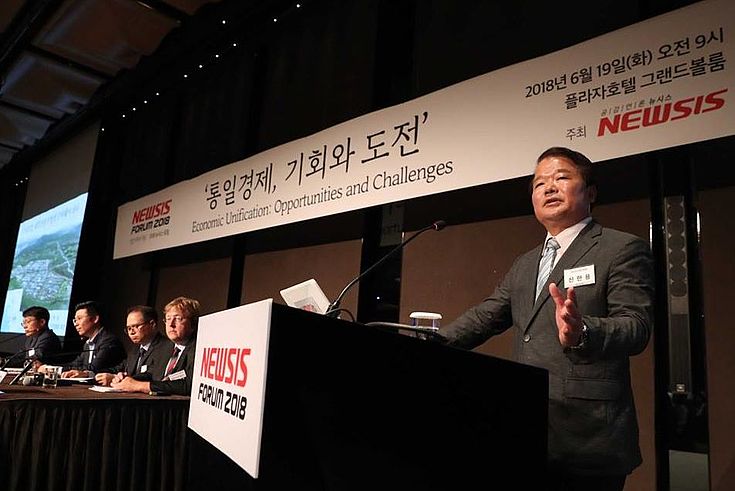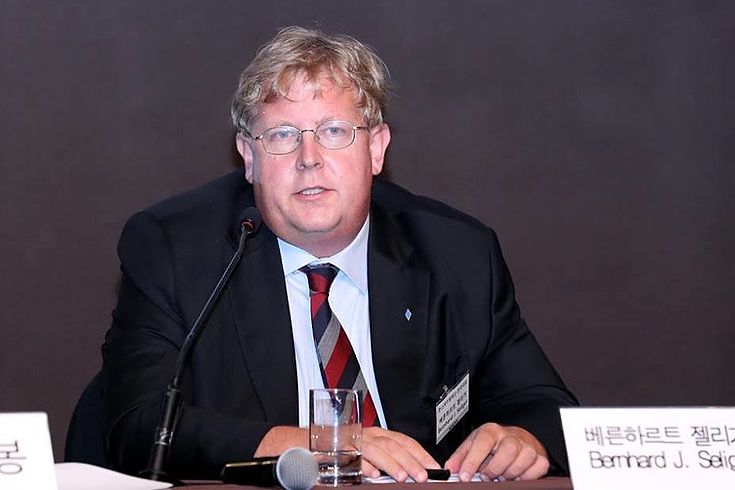Newsis Forum 2018
Opportunities and Challenges of Economic Unification in Korea
The participants of the Newsis Forum
Good Timing
On occasion of the 17th anniversary of Newsis news agency, Newsis organized its annual policy forum on the topic of economic unification. Given the dynamic developments on the Korean Peninsula, with the summits of President Moon Jae-In and Chairman Kim Jong-Un, as well as President Donald Trump and Chairman Kim Jong-Un, the question of economic integration and economic unification has become more current again. Not longer being a mere academic exercise, but an urgent policy problem, the issue could not have been more timely.
Experiences from German Unification
The forum was opened by Kim Hyoung-Ki, President-publisher of Newsis. Afterwards, Vice Minister Kim Jong-Ryol of the Ministry of Land, Infrastructure and Transport congratulated the organizer of the conference and the participants on their contributions. The keynote speech was held by Hon. Manfred Carstens, former Federal Vice Minister of Finance of Germany, as well as Vice Minister of the Ministry of the Interior under Chancellor Helmut Kohl during the years of German unification. He looked back at the German unification, an unexpected event not planned by either West or East and advised to look more to the dynamic development of the North Korean economy rather than tax-funded, government-led growth.
... and Implications for Korea
With hindsight, he judged the solidarity tax in Germany to have been a failure. Wages after a unification should correspond with productivity, and pensions with wages, with a generous bias regarding socially difficult groups having too low pensions. Costs directly related to unification, as infrastructure spending, should rather be financed in the first five years through a credit-financed fund (like the Fund German Unity in Germany), and later be repaid by the state budget, which presumably would strongly increase with successful economic transition in North Korea.
De-Nuclearization as a Precondition for Supporting North Korea
Suk Lee, Senior Director in the Department of Economic Policy and Strategy of the Korea Development Institute, looked at the preconditions for reconstruction of the North Korean economy and the role of the international community. He considered various measures of economic rehabilitation, but cautioned that all would only be viable under the precondition of real de-nuclearization. Regarding the role of international financial institutions, Lee was skeptical about the involvement of IFIs like the China-led AIIB. His paper was discussed by Hon. Manfred Carstens, Vice President Sang-Joon Lee of the Korea Research Institute for Human Settlements and Prof. Hyoungsoo Zang of Hanyang University. President Kyungjin Song of the Institute for Global Economics moderated the session.
Dr Bernhard Seliger representing the Hanns Seidel Foundation Korea
Opportunities of Economic Integration in Korea
The second session dealt with business opportunities during economic opening of North Korea, and maybe integration and unification on the Korean Peninsula. The session started with a presentation by Chairman Shin Han-Yong of the Kaesong Industrial Complex Business Association. Executive Director Cheon-ho Paik of Hyundai Asan, Dr. Bernhard Seliger of Hanns-Seidel-Foundation Korea and Prof. Lee Seong-Bong of Seoul Women’s University discussed the paper. The discussion was moderated by Executive Director Koh Youngsun of the Center for International Development of the KDI, a former Vice Minister of Labor.



